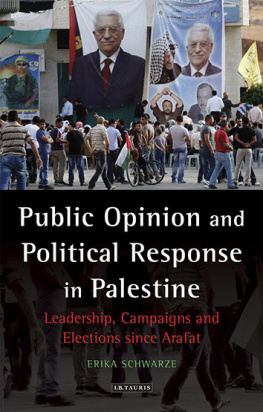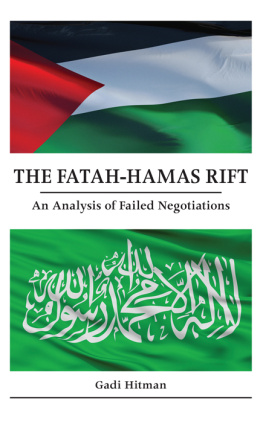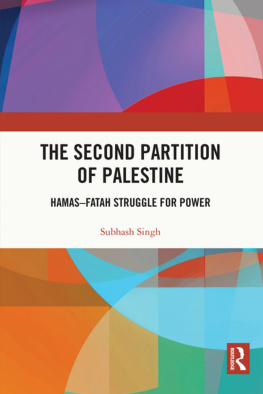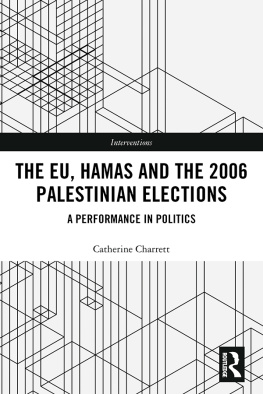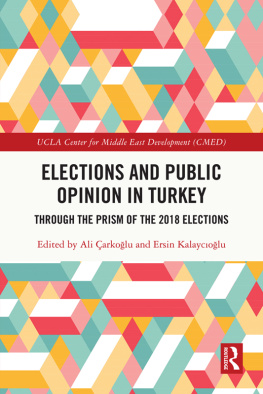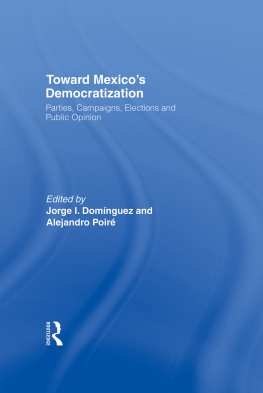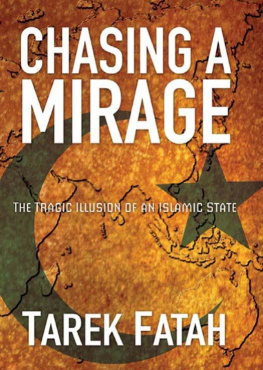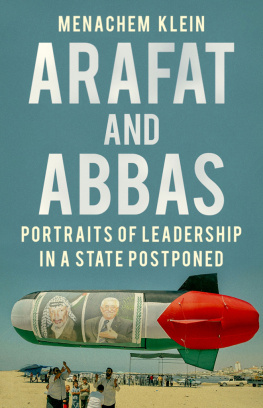Erika Schwarze worked in Palestine throughout the 1990s, including managing civic education programmes in the West Bank and the Gaza Strip for the German Friedrich-Ebert Foundation in the run-up to, and following, Palestines first parliamentary elections in 1996. She holds a PhD in Middle East Politics from the Centre for Arab and Islamic Studies at the Australian National University and now works on indigenous environment programmes for the Australian government.
This is a work of very high quality, both conceptually and in terms of its analytical insight. It addresses the underlying dynamics of Palestinian politics from a perspective that is well-grounded in experience of the region, while preserving the intellectual distance from immediate events that is necessary to achieve worthwhile insights into those dynamics.
Robert Bowker, Adjunct Professor, Centre for Arab and Islamic Studies, Australian National University
A brilliant and deeply informative analysis of an understudied yet crucial aspect of Palestinian politics: the responsiveness of the two main political parties Fatah and Hamas towards public opinion. Based on extensive interviews and rooted in a solid theoretical grounding, Schwarzes book provides a poignant account of why Fatah lost the 2006 elections, why Hamas won, and how subsequent sanctions and inter-Palestinian divisions changed the incentive structure for leadership responsiveness to public opinion for both parties.
Schwarze brings Palestinian politics into the realm of public opinion analysis and in so doing, extends public opinion analysis beyond the study of established democracies to that of arrested democracies, thus making an important theoretical contribution.
This book is essential reading for policy makers and those interested in Palestinian politics, leadership responsiveness and public opinion analysis.
Jeroen Gunning, Professor of Middle Eastern Politics and Conflict Studies, Institute of Middle Eastern Studies, Kings College London
Schwarzes book is the first of its kind to provide a comprehensive analysis of public opinion and political response to it in Palestine. It is original and innovative, with unsettling conclusions. It provides very valuable insights into the working of Palestinian society and politics, and the difficulties that have beset the Palestinian Authority in terms of making itself organically relevant to the Palestinian peoples demands and aspirations. It should be of serious interest to a range of readers, from policy makers and analysts to all those who are focused on what the future may hold for the IsraeliPalestinian conflict.
Amin Saikal, Distinguished Professor of Political Science and Director of the Centre for Arab and Islamic Studies, Australian National University
PUBLIC
OPINION AND
POLITICAL
RESPONSE IN
PALESTINE
Leadership, Campaigns and Elections Since Arafat
E RIKA S CHWARZE
For Damian,
and for my boys Johannes and Lucah
who shared this journey with curiosity and courage
Published in 2016 by
I.B.Tauris & Co. Ltd
London New York
www.ibtauris.com
Copyright 2016 Erika Schwarze
The right of Erika Schwarze to be identified as the author of this work has been asserted by the author in accordance with the Copyright, Designs and Patents Act 1988.
All rights reserved. Except for brief quotations in a review, this book, or any part thereof, may not be reproduced, stored in or introduced into a retrieval system, or transmitted, in any form or by any means, electronic, mechanical, photocopying, recording or otherwise, without the prior written permission of the publisher.
Every attempt has been made to gain permission for the use of the images in this book.
Any omissions will be rectified in future editions.
References to websites were correct at the time of writing.
Library of Modern Middle East Studies 182
ISBN: 978 1 78453 469 1
eISBN: 978 0 85772 982 8
A full CIP record for this book is available from the British Library
A full CIP record is available from the Library of Congress
Library of Congress Catalog Card Number: available
A NOTE ON TRANSLITERATION
Transliteration of Arabic terms in this book is intended to balance the interests of those who read Arabic with those who do not. Therefore, the only diacritics used are those for the Arabic letters Ayn and Hamza, indicated by single quotation marks ( or ) unless commonly used without diacritics. For widely known Arabic names, such as Yasser Arafat, Mahmoud Abbas or Gaza, the most common spelling is used. For uncommon names or translations, the more correct spelling is used, unless the persons themselves have used a different transliteration (for example leaving out the Al- prefix in the spelling of their surname), in which case their own spelling is adopted.
ACKNOWLEDGEMENTS
I would like to thank all those whose dedication, energy and intellectual rigour supported this research in so many ways.
In particular, I thank Ghassan Khatib and Jamil Rabah for their contribution to the development of the topic. Thank you to those who I consulted and interviewed, in particular Sabri Saidam, Luay Shaban, Mohammad Ishtayyeh, Qaddura Faris, Nader Said, Faisal Awartani, Omar Abdel Raziq, Mahmoud Musleh and Samir Abu Eisheh who shared deep and candid insights. For their personal support and for making our time in Palestine so memorable, I thank Elizabeth Awartani and Nihad Fattash and their families, Abu Hassan and Deniz Altayli, Khadijeh and Iz-Eddin Fattash, Bassem Al-Masri, Wael Saadi and Mahmoud Abu Eid and their families.
I gratefully acknowledge funding through an Australian Post-Graduate Award, ANUs field research and Faculty of Arts funding and the wonderful staff at the Centre for Arab and Islamic Studies at the Australian National University, in particular Matthew Gray, Bob Bowker and James Piscatori for their guidance and sharing of ideas, and Amin Saikal for supporting and encouraging the publication of this book.
My very special thanks to Rose Barbeau whose deep understanding meant that she could question and comment with authority, and to Charles Freer for sharing and supporting the journey.
And finally, my heartfelt thank you to my parents, the Conlan Clan, and the Mortlocks for the very practical support without which this book would not have been written.
GLOSSARY OF TERMS AND ABBREVIATIONS
| Alpha: | Alpha International for Research, Polling and Informatics |
| AWRAD: | Arab World for Research and Development |
| DCAF: | Geneva Center for the Democratic Control of Armed Forces |
| DFLP: | Democratic Front for the Liberation of Palestine |
| EU: | European Union |
| Fatah: | Palestinian National Liberation Movement |
| FAFO: | FAFO Institute for Applied International Studies |
| FCC: | Fatah Central Committee |
| Fida: | Palestinian Democratic Movement |
| FRC: | Fatah Revolutionary Council |
| Hamas: | Islamic Resistance Movement |
| IDF: | Israeli Defence Forces |
| JMCC: | Jerusalem Media and Communication Center |
| NEC: | Near East Consulting |
| NUG: | National Unity Government (2007) |

